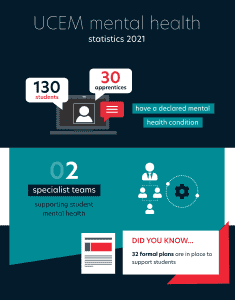Support for all
BUILT FOR ACCESSIBILITY
We are committed to providing all students with the support and tools they need to succeed. We offer tailored support to students with physical and sensory impairments, specific learning difficulties, autism spectrum disorders, mental health conditions, and long-term health conditions.
The umbrella term ‘disabilities’ includes, but is not limited to, the following:
- Specific learning difficulties (e.g. dyslexia, dyspraxia)
- ADHD
- Sensory impairments
- Mobility difficulties
- Mental health conditions
- Autism spectrum disorders
- Long-term health issues (e.g. diabetes, arthritis, cancer, Crohn’s disease)
We know that each person’s disability can affect them in different ways, so the support we offer is flexible and tailored to individuals. We encourage all students with disabilities to contact us so that we can discuss meeting your individual needs. You can do this before you apply, during the application process or at any point throughout your studies.
To speak to a member of the team, please email us or book an appointment directly with Richard, Lucie, or Lydia by clicking on their picture below. They are able to discuss the support we can offer, with Lucie specialising in specific learning difficulties, Richard focusing on mental health and long-term health conditions, and Lydia specialising in ADHD and Autism.
The National Association of Disability Practitioners has created a ‘School vs University – a glossary and explainer’. This document may be useful to the UK students who are transferring from school or college to higher education and seeking to understand more about the support they can access.
BOOK AN APPOINTMENT
Mental health
BUILT FOR SUPPORT
At UCEM we aim to promote good mental health and wellbeing in everything we do. We have created a Self-Care Guide for Students which aims to help students cope with any university stress they could face. It also includes links to teams within UCEM that can provide support and information about the external charities we advocate.
Whether you have received a mental health diagnosis from your doctor, you are going through something difficult or you just don’t feel quite yourself, you can talk to us. Whether it be through a formal Additional Support Plan, or helping you to find resources to improve your wellbeing, we want to support you to get where you want to be.
Anything discussed with the disability and welfare team will be in complete confidence. The only time we will share information is if you provide consent or we have a genuine safeguarding concern.
Specific learning difficulties
BUILT FOR GUIDANCE
If you struggle with poor focus and attention, difficulties in organising thoughts for writing and left/right confusion, you may be one of the 10% of the UK population that have a specific learning difficulty (SpLD) such as dyslexia, dysgraphia, dyscalculia or dyspraxia.
SpLDs are lifelong neurological difficulties that can present themselves in multiple ways. There are many positives to having a SpLD, such as above average intelligence, creativity and problem-solving skills, however, there can be some parts of a SpLD that make studying difficult. With the right support and guidance, an SpLD doesn’t have to limit your academic attainment or career.
To find out more about SpLDs, have a look at the following links:
- British Dyslexia Association for information about dyslexia
- Dyspraxia Foundation for advice around dyspraxia
- HelpGuide for an article around ADHD, specifically in adults
Support and reasonable adjustments are available to UCEM students studying with an SpLD. To find out more about the support available or to discuss arranging a dyslexia assessment please email wellbeing@ucem.ac.uk
Student Finance and Bursary Scheme
BUILT FOR HELP
If you are a UK-based non-apprenticeship student, you may be entitled to apply for the Disabled Students’ Allowance (DSA). This can provide extra financial support to cover the costs you have because of a disability, long-term health condition, mental health condition or specific learning difficulty such as dyslexia. The support you are given is not based on income but depends on your individual needs. You can apply for DSA if you are a UK, non-apprentice, students studying either a full-time or part-time programme that lasts at least one year.
- If you live in England, you can find information about how to apply on the Government website
- If you live in Wales, you can find information about how to apply on Student Finance Wales
- If you live in Scotland, you can find information about how to apply on Student Awards Agency Scotland
- If you live in Northern Ireland, you can find information about how to apply on Student Finance NI
At UCEM, we also offer a variety of bursaries and financial support for those that need additional help funding their studies or accessing a career in the built environment.
Disabled Students Allowances
For advice and guidance on applying for DSA please email disabilitysupport@ucem.ac.uk
STUDENT STORIES
BUILT FOR SUCCESS
Nicki Robinson, Surveying Technician Diploma (Quantity Surveying) L3 Apprentice
Awarded July 2020
“Since being at UCEM I have received excellent support from the disability and welfare team. When it was suggested to me that I should have a dyslexia assessment, I took the opportunity after completing an online screening. I’d never been given any extra support before or considered that I may have dyslexia. At first, when the assessor told me I had dyslexia, I found it upsetting but they helped me to see my strengths and how I could use my learning difficulty to my advantage.
Through an Additional Support Plan, I had access to Clear Links who provided me with excellent study skills support. Over the length of my programme, I had three tutors who I met with fortnightly over Skype or alternative video calls. They were very flexible which allowed me to connect with them on my study days once I’d spent the morning working on an assignment or piece of work. I also had access to assistive technology for my computer including Dragon Professional and ClaroRead. I’ve used these to write my assignments as speaking my thoughts is so much easier for me than typing.
The apprentice support tutors were also there to help with academic queries and pushed me to succeed. Completing my programme at UCEM has meant that I’m able to progress in my career and move towards the RICS assessment. This is something that I thought was a long way off after taking time out to be a mum for many years. I would definitely suggest getting in contact with the team.”
Christopher Scotland, Surveying Technician Diploma (Quantity Surveying) L3 Apprentice
Awarded July 2020
“Whilst on my studies at UCEM, it was brought to my attention that I may have a form of learning difficulty. It had been suggested that I could be dyslexic. At first this worried me, as I thought it could affect my studies and I wouldn’t be able to complete them to the standard which I felt would be acceptable. This was definitely not the case!
I was put in contract with the disability and welfare team at UCEM and they made sure that I took a dyslexia assessment. The assessment was incredible, extremely professional and nothing to worry about at all. I got my results sent directly to me within five days. This quick timing helped me a lot as the programme had strict timings and I didn’t want to lose marks. I couldn’t recommend this service more. I was put in contact with Phoebe (UCEM disability and welfare team) who made it top priority that I was put in contact with various companies that supplied and set up equipment which helped me focus and write my assignments. This was equipment I can now use in my professional career to make sure I stay on top and give me the chance to maximise my success. Also, I was put in contact with a company called Clear Links. They provided me with a study skills tutor, who would go through my work and suggest any grammatical and spelling corrections needed. They would also help with improving my professional language skills. They worked closely and confidentially with my company which made the service relatively stress free and made me feel that I wasn’t ‘brainless’.
Overall, I managed to achieve a Merit and am now in the process of moving up within my company. This was something that I never felt I was able to achieve. This really has improved my outlook on myself and how achievable challenging tasks are. I look forward to many more challenges.”
Disability and wellbeing
Awareness events
University Mental Health Day brings together students and staff to make mental health a university-wide priority
Hosted by the Mental Health Foundation, the Mental Health Awareness Week focuses on encouraging conversation around mental health and the support we can offer one another
The Men’s Mental Health Week works to ensure that all men and boys have the information, services and treatments they need to live healthier lives
Samaritans is there to listen, without judgement, 24 hours a day 7 days a week. Talk to Us is one of the ways Samaritans raises awareness of their service and local branches
Focusing on empowering those with dyslexia, the Dyslexia Awareness Week highlights what we can do to support those with neurodiversity
The aim of this week is to raise awareness of dyspraxia and break down the stigmas that continue to surround it
Promoted by the United Nations, the International Day of People with Disabilities aims to empower disabled people across the globe
Online learning with UCEM
Why it can be more accessible for neurodiverse and disabled students
- Students can study in their own time. Everything on the UCEM VLE is recorded and can be accessed 24/7 so students can study in a way that fits their schedule and learning style. Students can also go back over the resources as many times as they need.
- The flexibility of the course can make it less stressful. Students can also work from anywhere, so if they struggle in more formal settings such as classrooms or libraries they easily work somewhere better suited to their needs
- UCEM has removed all exams, a primary source of stress and accessibility issues for students
- Students can find engaging with others online to be easier and more accessible than in face-to-face settings. Online there is often is less pressure from other students which can reduce fear of failure or judgment. Online learners also have easy access to all the resources they need.
- Travel to and around campuses and university buildings can provide barriers to students with a range of disabilities and neurodiversity’s that don’t occur in online learning
- Students with disabilities and neurodiversity often require less adjustments to the course when it is online compared to campus based
- In order to make sure online learning isn't isolating, UCEM has a team of ambassadors and student reps working on building a supportive community alongside out student support teams
- Study with UCEM is flexible and students are encouraged to manage their own workload and utilise processes such a the mitigating circumstances procedure if needed
- Just like face-to-face university students. UK based non-apprentice students can access DSA to support them with the extra costs associated with studying with their disability
Neurodiversity FAQs
Everything you need to know
Neurodiversity refers to the different ways the brain can work and interpret information. It highlights that people naturally think about things differently. We recognise autism spectrum disorders, ADHD, and specific learning difficulties such as dyslexia as examples of neurodiversity.
Any queries regarding neurodiversity and the support available should be directed to the Disability and Welfare Team.
We also have a student ambassador (welfare) who is there to talk to you about your experience as a student with neurodiversity. You can join them on the Student Ambassadors LinkedIn Group.
All students can access support through our academic support tutors. Their contact information can be found on each module page and they will be able to support with assignment preparation and study skills.
Further reasonable adjustments are available to students with specific needs identified by a qualified and registered specialist teacher/assessor or psychologist. Using this information, we will then work with you on an individual basis to create an Additional Support Plan. This could include, for example, not being penalised for errors in spelling and grammar, extensions to coursework deadlines, and additional time in Computer Marked Assessments (CMAs).
If eligible, the disability and welfare team will advise and assist you with applying for the Disabled Students’ Allowances (DSA). DSA is a UK government grant that can help to pay for specialist study skills support, assistive software, and equipment amongst other things. More information can be found on the YourDSA Website.
Alternatively, apprentices can access funding for assistive technology and additional support through the Educational Skills Funding Agency (ESFA). Examples of the support available through ESFA include specialist study skills tutors, mentor support, text-to-speech software, voice recognition software and mind mapping software. Apprentices interested in finding out more about ESFA funded support should contact the disability and welfare team.
For reasonable adjustments to be implemented, students are required to provide a full diagnostic report carried out by a qualified and registered specialist teacher/assessor or psychologist. If you do not have access to this please contact the Disability and Welfare Team who will be able to advice on the options available.
At school or college, you may have been assessed for access arrangements and given a JCQ Access Arrangement (Form 8). While this provides useful information and can potentially be used to make basic reasonable adjustments you will not be able to access funded support as a Form 8 does not formally identify specific learning difficulties. or conditions such as ADHD or those on the autism spectrum we can accept a doctor’s letter as evidence of a medical diagnosis.
For conditions such as ADHD or those on the autism spectrum we can accept a doctor’s letter as evidence of a medical diagnosis.
It is common for students to have gone through school without being identified with neurodiversity. If you are concerned that your studies are being effected by difficulties associated with neurodiversity, please contact the disability and welfare team for advice and guidance. The team can provide you with free access to an online dyslexia screening which will give an indication as to whether a full assessment is required.
The team can also assist with finding an assessor. They can advise on possible support with covering the cost of the assessment through either the Student Hardship Fund or our charity partner Chartered Surveyors Training Trust (CSTT).
We cannot provide in-house dyslexia assessments. The disability and welfare team can provide screenings to give an idea as to whether you may have traits of a specific learning difficulty. Following a screening, the team will advise on the next steps which may involve assisting you in finding an assessor. They will also be able to advise on any funding support available through the Student Hardship Fund or our charity partner Chartered Surveyors Training Trust (CSTT).
There is no obligation for you to disclose information about your neurodiversity. We do however, encourage everyone with neurodiversity to let the disability and welfare team know so we can discuss the range of support available. If you wish to have reasonable adjustments put in place or access funded support you will need to disclose information regarding your neurodiversity and provide diagnostic evidence.
It is your choice whether to discuss your needs with your employer. If you are an apprentice, you may find it useful to talk with your apprenticeship outcomes officer first so they can help you to approach your employer. Letting your employer know about your neurodiversity can help you to access in-work support through initiatives such as Access to Work.
The disability and welfare team have created the employer’s guide to supporting students with neurodiversity. In it you will find the range of support available to your employees.
Safeguarding
Safeguarding is the action taken to promote the welfare of everyone and protect them from harm. UCEM has a fully trained Safeguarding Team made up of staff members across different teams and departments. All UCEM students, regardless of age, have the right to be protected from abuse and to be safe during the activities they choose. In the context of UCEM, the institution has a duty to establish appropriate arrangements for the protection of abuse of children, young people under the age of 18, and vulnerable groups. You can read UCEM’s policies and procedures to find out more.
To contact the Safeguarding Team email safeguarding@ucem.ac.uk and one of our Safeguarding Officers will respond to you within one working day. You can also call the Safeguarding Team on 0118 4672400 Monday-Friday between the hours of 9am-5pm UK time.
UCEM also has a team of fully trained Mental Health First Aiders. They are all trained to listen respectfully and non-judgementally. They can listen to your concerns and help find the right support if, and when, needed. If you want to talk to a member of the team, please email safeguarding@ucem.ac.uk giving your name and contact telephone number. One of our trained Mental Health First Aiders will phone you back as soon as possible.
Prevent
Section 26 of the Counter-Terrorism and Security Act 2015 (the Act) places a duty on certain bodies (“specified authorities” listed in Schedule 6 to the Act), in the exercise of their functions, to have “due regard to the need to prevent people from being drawn into terrorism” (GOV.UK, 2021).
If you are concerned or have any questions, you can contact the Safeguarding Team at safeguarding@ucem.ac.uk. You might want to talk about a friend or family member, or you might want to talk about support for yourself. This could include emotional support if you have been affected by any incident.
If you have an immediate concern and believe that there is a risk to someone’s safety, you should always contact the police first on 999.
Policies
For UCEM’s policies relating to Safeguarding and Prevent, please look at the Code of Practice page.
USEFUL CONTACTS
Disability and Welfare Support
UK (Free): 0800 019 9697
International: +44 (0)118 921 4696










